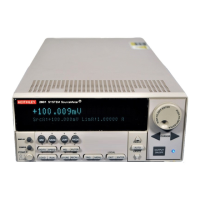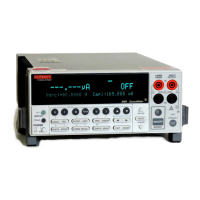4-4 Controlling Multiple SourceMeters Series 2600 System SourceMeters User’s Manual
2600S-900-01 Rev. A / May 2006 Return to In this section:
Step 4: Check the state of the TSP-Link system
Reference Refer to “Initialization” in Section 9 of the Series 2600 Reference
Manual for more information on checking the state of the TSP-Link.
The tsplink.state read-only attribute is used to determine whether or not the
TSP-Link reset routine was completed successfully. The returned value
online
indicates that the reset was successful for all instruments (nodes) in the system.
The value
offline indicates that the reset has failed.
A few typical reasons for a reset failure include the following:
• Two or more instruments in the system have the same node number.
• There are no other instruments connected to the unit performing the reset.
• One of the units in a properly connected system isn't powered on.
Programming example – After assigning node numbers to the instruments in the
system, the following command checks the state of the TSP-Link:
print(tsplink.state)
If the reset is successful, online will be the output to indicate that communication
to all nodes is established.
How do I use the expanded system?
Reference Refer to “Using the expanded system” in Section 9 of the Series
2600 Reference Manual for more information on using the system.
Accessing resources of TSP-Link nodes
After a successful TSP-Link reset, the node and localnode variables can be
used to access resources of any node in the system.
Using node[N]
The node[N] variable (where N = 1 to 64) is used to send a command to any
node in the system. The node can be the Master or a Slave. Examples:
node[4].smua.reset() -- Resets SMU A of Node 4.
node[1].smua.reset() -- Resets SMU A of Node 1.
Using the alias (localnode)
The variable localnode is an alias for node[N], where N is the node number of
the Master.
For example, assume that Node 1 is the Master in a TSP-Link system. To send a
command to Node 1, you can use
node[1] or localnode as follows:
node[1].smua.reset() -- Resets SMU A of the Master (Node 1).
localnode.smua.reset() -- Resets SMU A of the Master (Node 1).
